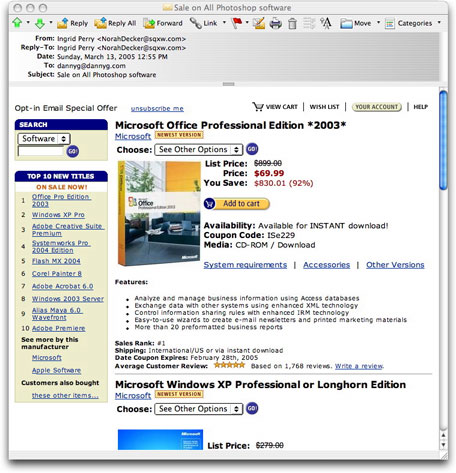« Mr. [Random Name] has $[Random Amount] For Me! | Main | A Different Kind of Blog Spam »
| Home | The Book | Training | Events | Tools | Stats |
March 13, 2005
Going For the Ripoff Record?Spamdom is flooded with offers for so-called OEM software. Translation: Pirated software at prices that are, indeed, too good to be true. Forget about getting support or an upgrade to the next version. A lot of the sites also don't deliver the software, but are interested only in your credit card data.
There's one guy who goes to a little more trouble than most in the hopes of fooling recipients into thinking the offer is legitimate. His HTML email message imitates the amazon.com Web page format, right down to stealing the images directly from amazon's site (the image source URLs are from amazon). The only thing missing is any displayed textual reference to "amazon.com" in the email message, presumably as a defense against whatever amazon's lawyers might wish to pursue.
After making sure that there were no Web bugs or other nastiness in the message source code, I viewed the message in my email reader. Here's how it looks:
(You can also view the full-size 218KB image in a separate window.)
The first item up for sale on "The Price is Not Right" is Microsoft Office Professional 2003. If you compare the phony lookalike offer to the real amazon offer, you'll find plenty of ripped-off text and art. All of the product and purchase related links, however, go to the OEM scammer's Web site.
Notice how the "OEM" retail price is $899.99, while amazon's retail price is $499.99. Makes the OEM savings percentage look real good when you artificially inflate the retail price. Imagine how the OEM version gets a 5-star review (from 1,768 reviews) while amazon's authentic version gets only 3.5 stars (from 27 reviews). Oh, and scammy forgot to change the Date Coupon Expires date.
I get a huge kick out of the next offering in the email: "Microsoft Windows XP Professional or Longhorn Edition." Scammy's site is hosted in China, where one can reportedly get DVDs of movies even before the films are released anywhere in theaters. Does that work for software, too?
I'll let Microsoft, Adobe, Symantec, and other publishers whose products are being pirated fend for themselves. They don't need my help. The same goes for amazon. What peeves me, though, is the deception perpetrated on recipients of these messages. If recipients associate the look and feel of the message with amazon.com—I mean there are thousands of Web pages that offer products through legitimate amazon affiliate connections—buyers might expect the same level of customer service and communication they receive from amazon—and be severely disappointed.
Just because an offer looks slick doesn't make it any more legitimate than the text-only version. It just means that the scammer knows something about HTML. Whoop-de-freakin'-do.
Posted on March 13, 2005 at 03:11 PM

